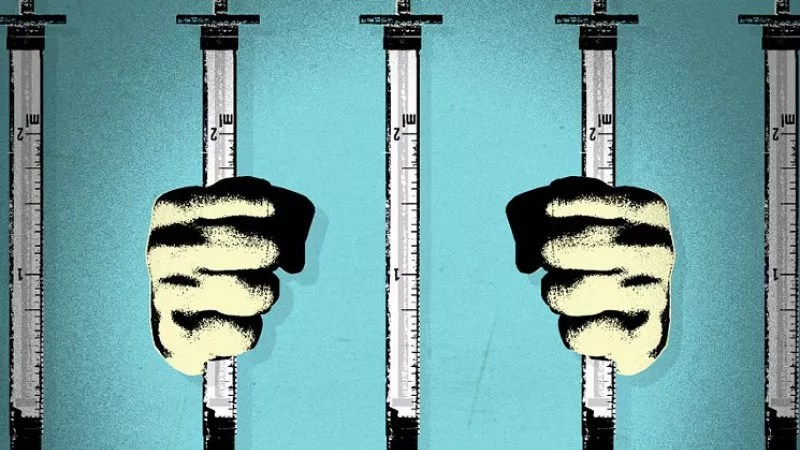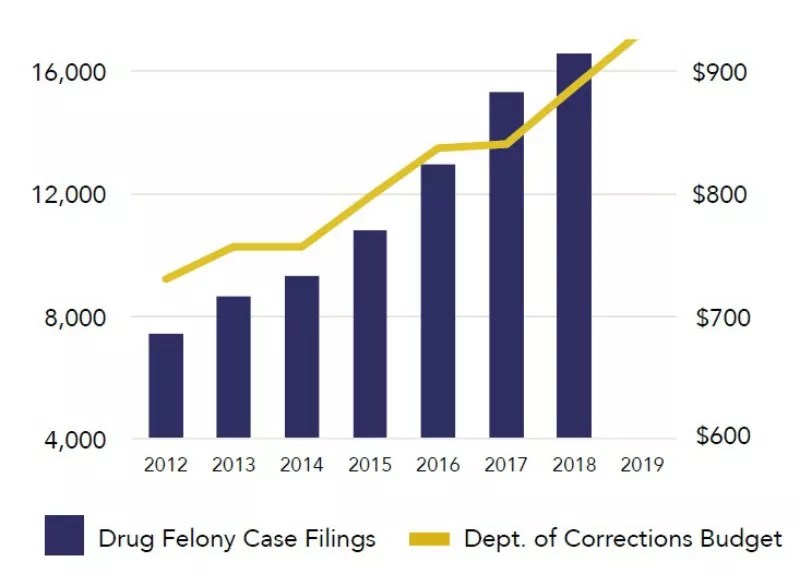
Westword illustration

Audio By Carbonatix
Update: HB 19-1263, sponsored by representatives Leslie Herod and Shane Sandridge, which eliminates felonies for drug possession, was approved by the House judiciary committee on April 2. Continue for our previous coverage.
Drug felony filings in Colorado have more than doubled in the past six years, helping to fuel an explosion in both the overall number of state prisoners and the budget for the Department of Corrections. Yet the vast majority of the cases involve possession – an offense that in many, if not most, cases could be dealt with more effectively by treatment rather than incarceration.
These are some of the takeaways from a special report on drug felony filings by the Colorado Criminal Justice Reform Coalition.
According to Christie Donner, the organization’s executive director, the volume of such charges is costing taxpayers plenty and placing greater strain on an already stressed system.
“About 30 percent of all state felony filings are for drug offenses,” Donner explains. “And Denver leads the way, with 41 percent. That’s clogging up the courts, so there’s a budget request for more judges. But more judges means we’ll need more prosecutors and more public defenders and more court staff. So not just prisons are impacted – and this is happening across the state.”
Annual drug felony filings in Colorado went up 123 percent from 2012 to 2018, with only a handful of judicial districts registering boosts of under 50 percent and many more going up in excess of 150 percent, CCJRC stats show.
Moreover, 75 percent of the drug felony cases filed in Colorado in 2017 were for possession rather than distribution or more serious crimes. That same year, the CCJRC points out, 84 percent of those who were sentenced to prison for possession were originally charged with that offense, rather than accepting a plea deal to get out from under a heavier allegation.
Last December, the Colorado Department of Corrections submitted a budget proposal asking for an additional $40 million to expand prisons in the state, and a Colorado Division of Criminal Justice study released earlier in 2018 lays out many of the reasons why. “The Colorado prison population is expected to increase by 38.2 percent between fiscal years 2017 and 2024, from an actual year-end inmate population of 20,101 to a projected population of 27,770. This rate of growth is substantially higher than that predicted at this time [in 2017].”
Nonetheless, the DOC request didn’t fly, much to Donner’s relief. “Thankfully, the legislature decided they don’t want to build new prisons unless they have to,” she notes. “And the reality is, they don’t have to. We have a lot of other options.”

This graphic juxtaposes the rise in felony drug filings with the increasing Colorado Department of Corrections budget.
In 2018, the CCJRC issued an analysis that touched on many of these issues. “What caught our attention was how the number of felonies filed for drug offenses was increasing,” Donner says. “We realized, holy cow, this is going up really dramatically. So we dug back into our data to figure out what this was looking like across the state. We wanted to know: Is this happening only in urban areas and not in rural areas? And it wasn’t. It was happening everywhere.”
The next question for Donner: “How do we get out of this loop? So this time, we polled Coloradans about what direction they wanted the state to take. And by overwhelming margins, they said they don’t want to open up another prison. Instead, they want to look at ways to reduce the prison population. And they also think drug policies should focus more on treatment and less on incarceration and punishment.”
These views dovetail with the coalition’s arguments about possession, “which has been a longtime concern for us,” Donner continues. “A felony charge for simple possession when there’s no evidence of distribution feels like it’s fundamentally too harsh a penalty. It’s just not a crime worthy of a felony, but we have a couple hundred people a year being sentenced to prison for simple possession. And people understand that those dots connect as well.”
Indeed, when asked if they believe the punishment for possession should be reduced from a felony to a misdemeanor as one way of reducing the prison population, 63 percent of poll respondents argued for lowering the penalty.
If the 200 or so individuals sentenced to prison for drug possession each year weren’t behind bars, “we’d have the vacancy needed so we wouldn’t be overcrowded,” Donner estimates. “So in the short term, this would fix the immediate problem. But to get a better handle on effective re-entry and how to better approach people with addiction, additional reforms are necessary. We have relied on jails for decades to deal with people who are addicted, and it’s appalling – and it doesn’t work.
“These institutions were never designed to be treatment centers, and they can’t be relied upon to do that,” notes Donner.
That’s why the CCJRC is supporting House Bill 19-1263, which was introduced on March 22 and will be heard in the house Judiciary Committee on April 2; it’s sponsored by representatives Leslie Herod and Shane Sandridge, as well as senators Vicki Marble and Pete Lee. If approved, the measure would reduce felony simple drug possession crimes in the state to misdemeanors; those convicted of possessing drugs for personal use would face a maximum of six months in jail and two years of probation, instead of the current maximum penalty of 18 months. The bill would also lower penalties for other drug possession misdemeanors and remove the felony charge for possessing more than 12 ounces of marijuana. The bill would not make any changes related to drug-distribution offenses.
“Our state cannot afford to continue doling out felony convictions and sending people to prison for drug possession,” Herod allows in a statement provided to Westword. “It has not made our community safer, but it has created a whole host of problems for many people and families in our community. Permanently branding drug users as criminals makes it harder for them to access the things they need to get back on their feet, like stable housing and employment. Most Coloradans agree we should focus more on treatment and prevention instead of punishment and incarceration, and that is exactly what this legislation does.”
Additionally, the proposal would create a grant program to provide funding for drug courts in Colorado counties. “I think all of us can agree we need different solutions,” Donner concludes.
Click to read the Colorado Criminal Justice Reform Coalition’s special report on drug felony filings. Read HB 1263 here.